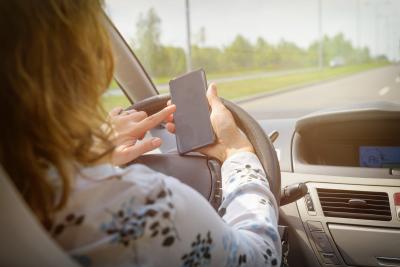Understanding The Dangers & How To Prevent Distracted Driving

Your children are screaming in the backseat, your phone is ringing, and there are billboards with food on them everywhere you look – is that your stomach rumbling…? April is distracted driving awareness month. Distracted driving has caused rate increases in the auto insurance market now for the past 10 years and has increased rates here in Ohio year after year.
Most of us strive to shake off all distractions and ultimately be better drivers, but sometimes it’s challenging. According to the CDC, every day about 8 people in the US are killed due to crashes that are reported involving distracted driving. It’s sobering information, but it is extremely important. We have some tips to help remind you to stay focused while behind the wheel.
#1. Stop Eating While Driving
This one seems difficult for those who are flying by the seams of their pants. We think that eating while on the road will save us time. While this might be true, it could end up wasting a lot of time when you take your eyes off the road to clean up the debris and get into a fender bender. Eating at the steering wheel might not seem like a distraction at face value, but it can turn into a big one. It’s best just to pull off and eat at a stop. If you must have a car fry, have your passenger feed you while you drive!
#2. Stop Using Your Phone While Driving
“But I have Bluetooth and can use voice-to-text!” Even with these awesome innovations, we can still end up distracted from the call itself. The American Automobile Association reports that drivers can remain distracted for up to 27 seconds after a phone call, even when using a hands-free device. Resist the urge and put your phone in an unreachable place. Some phones even have safety features that can sense when you are driving and switch to a special mode that will shut off all notifications.
#3. Adjust All Settings Before Hitting the Road
The bells and whistles installed in cars today give us so many options! Those options can also distract us. Set your GPS, and adjust the temperature, music, and seat placement BEFORE you put the car in drive. It might not seem like a big deal to push a button, but every second counts while driving.
#4. Keep Watch on the Road
You can respond to the passenger without looking at them. You can also check out the scenery that is in front of you while keeping an eye on the road. Billboards can try to distract and they might succeed, but it’s necessary to keep your view front and center.
#5. Don’t Drive When You Are Exhausted
Just like drunk driving, drowsy driving causes a lot of accidents every year. If you are feeling too tired to drive, pull off immediately and find a safe place to rest.
#6. Clean and Organize Your Vehicle
Our surroundings affect us. You might not realize it right away, but that trash on the floor or the dust on the dash can have you fumbling for a solution while you are driving. Before or after your next trip, do a little upkeep of the interior. Wipe that dash, get rid of all the garbage, and organize the stuff in the backseat. The cleaner the cabin, the less distracted you will be.
#7. Be a Good Example and Avoid Distracted Driving
While driving with others, pretend they are your driving instructor or – better yet – pretend YOU are the driving instructor. You are an influence, especially to those who will learn to drive someday. Be a good one! If anything, they won’t have a reason to heckle you later when the topic of bad driving comes up.
Our society has become so used to driving that it’s become second nature. You feel you could do it in your sleep and have probably been on autopilot before while driving. We minimize the importance of these things when they are so ingrained. It’s time to change that notion. A car is a powerful machine. It can do terrible damage and harm, not just to ourselves but to others, if not used properly. Next time you take the wheel, take a moment to realize the power you yield and go forward with a focused mindset.
While evaluating your driving habits, have you evaluated your car insurance? Greg Fay Insurance agency sells a great range of different policies that will help you save money! Contact our agency today!
Dangers of Distracted Driving
You work your way around them and look in their car to see what’s going on. They’re texting away… Click, click, click… only glancing up every once in a while to look at the road. DRIVING is the LAST thing on their mind… it’s a nuisance. I don’t know about you, but I get the urge to run them off the road when I see it! Perhaps I’ll save a life by doing this! Well, common sense tells us texting and driving is dangerous, but the article below lists the actual statistics.
The popularity of mobile devices has had some unintended and even dangerous consequences. We now know that mobile communications are linked to a significant increase in distracted driving, resulting in injury and loss of life.
According to The National Highway Traffic Safety Administration, in 2012 driver distraction was the cause of 18 percent of all fatal crashes – with 3,328 people killed – and crashes resulting in an injury – with 421,000 people wounded.
Forty percent of all American teens say they have been in a car when the driver used a cell phone in a way that put people in danger, according to a Pew survey.
The Virginia Tech Transportation Institute found that text messaging creates a crash risk 23 times worse than driving while not distracted.
11% of drivers aged 18 to 20 who were involved in an automobile accident and survived admitted they were sending or receiving texts when they crashed.
Distracted driving endangers life and property and the current levels of injury and loss are unacceptable.
To stem this problem, the FCC is working with industry, safety organizations, and other government agencies, to inform and educate the public about the dangers of distracted driving and is seeking to identify and facilitate the development of innovative technologies that could reduce the incidence of distracted driving. To help in this effort and share information, we created this dedicated website.
Distracted Driving Information Clearinghouse

In addition, to collect and share information about consumer outreach activities and technology that could potentially reduce the problem of distracted driving, the Commission’s staff created the FCC Distracted Driving Information Clearinghouse.
State Laws
Currently, there is no national ban on texting or using a wireless phone while driving, but several states have passed laws banning texting or wireless phones or requiring hands-free use of wireless phones while driving.
What You Can Do
- Give Clear Instructions: Give teen drivers simple, clear instructions not to use their wireless devices while driving. According to the Cellular Telecommunications Industry Association, the easiest way to say it is: “On the road, off the phone.” Before new drivers get their licenses, discuss the fact that taking their eyes off the road – even for a few seconds – could cost someone injury or even death.
- Lead by Example: Children learn from their parent’s behavior. No one should text and drive. Be an example for your children and if you need to text or talk on the phone, pull over to a safe place.
- Become Informed and Be Active: Review the information in our Clearinghouse and the literature on the websites mentioned above. Set rules for yourself and your household about distracted driving. Tell family, friends, and organizations to which you belong about the importance of driving without distractions. Take the information to your children’s schools and ask that it be shared with students and parents.
For more information about wireless devices and driving, visit the FCC’s Distracted Driving Website.
For information on other communications issues, visit the FCC’s Consumer Website or contact the FCC’s Consumer Center by calling 1-888-CALL-FCC (1-888-225-5322) voice or 1-888-TELL-FCC (1-888-835-5322) TTY; faxing 1-866-418-0232; or writing to:
Federal Communications Commission
Consumer and Governmental Affairs Bureau
Consumer Inquiries and Complaints Division
445 12th Street, SW
Washington, DC 20554


